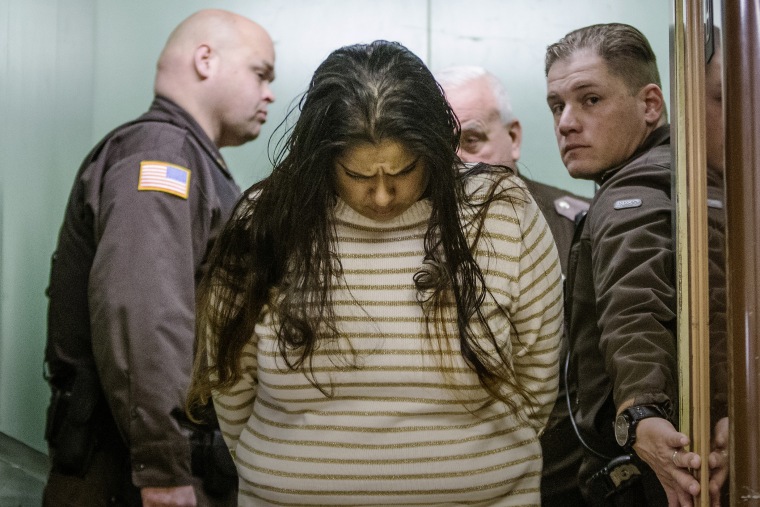INDIANAPOLIS — The Indiana woman facing 20 years in prison after she took pills to end her pregnancy was not present in the stately Indiana Court of Appeals courtroom Monday afternoon. But dozens of activists, who say Purvi Patel's case is proof of the risks of criminalizing pregnancy outcomes and puts women of color disproportionately at risk, packed the seats to show their support.
Where the three-judge panel stood was less clear. They asked probing questions of both sides, clearly mindful of the policy implications for both pregnant women and their dependents, as well as for criminal law.
In 2013, Patel showed up in an emergency room bleeding and showing signs of advanced pregnancy without a baby. Doctors called the police, who found fetal remains in a dumpster and, in Patel's home, receipts from abortion pills ordered online. Patel's lawyers said she believed she was no more than 12 weeks pregnant, but experts at trial said it was more like 25 weeks. She said she delivered a stillborn, but the jury accepted the prosecutors' evidence that the baby had been born alive and convicted Patel last year of feticide and neglect of a dependent.
According to the National Advocates for Pregnant Women, Patel is the first woman in the country to be convicted and sentenced under a feticide law for having an abortion.
Patel's new defense attorney, Lawrence Marshall, co-founder of the Center on Wrongful Convictions, told the three-judge panel that the charges made no sense and improperly relied on each other to result in conviction. Feticide, he said, should have referred to Patel’s conduct before delivery, but according to the state, the fetus didn't die in utero, and under Indiana law, neglect of a dependent only begins after birth. Instead, Patel was convicted of both because, the state said, she ended her pregnancy and did not seek medical care for what they said was a newborn.
RELATED: Appeal for Indiana woman convicted for having an abortion
Marshall also said that to satisfy the neglect of a dependent charge — which carries the greater penalty — the state should have proved to the jury that Patel could have saved the baby’s life if she had called 911. “Not a single expert ever said in any sort of declarative way that, yes, this infant would have survived had Ms. Patel done differently,” Marshall said.
Another problem with treating the feticide law as an illegal abortion statute, Marshall said, is that unlike the state’s abortion law, which does not criminalize earlier abortions, all pregnancies are treated the same whether they are one week in or a day before birth.
At various points throughout the argument, the judges seemed attuned to the public health notion that applying too harsh a standard to pregnant women for their pregnancy outcomes — say, for smoking cigarettes — could discourage them from seeking medical care. “Accepting the state’s interpretation would… expose countless women to prosecution,” said Marshall.
Chief Judge Nancy Vaidik pressed Ellen Meilaender, who argued the state's case, on whether the legislature intended pregnant women to be prosecuted under a feticide statute. (It was passed after a pregnant bank teller was shot.) She responded that the plain language of the law doesn't exempt women themselves.
RELATED: Women are already being prosecuted for having abortions
Referring to restrictions on abortion passed in the state of Indiana that specify that the pregnant woman won't be criminalized, Judge Terry Crone asked, "Do you think [the legislature] is consciously saying, 'We’re not going to prosecute abortion of children because of gender or race or partial birth abortion, but we are going to prosecute them for any other kind of abortion?'"
Meilaender responded that the legislature had years to clarify the law to exempt women after another woman, Bei Bei Shuai, was prosecuted for feticide. The idea that women could be prosecuted, she said, "would be consistent with ways in which the Indiana legislature has expressed respect for unborn life." She said that Patel's neglect stemmed from refusing to seek medical care, and that lying to doctors at the hospital showed she was aware of the criminality of her actions.
Meilaender declined comment after the hearing, as did Marshall. Lisa Sangoi, an attorney at the National Advocates for Pregnant Women, which filed a brief on Patel's behalf, argued that the precedent set by prosecuting her was troubling.
"Anything a woman does and doesn’t do can potentially affect her pregnancy," she said. "To hold a woman criminally culpable for her perceived pregnancy outcomes really takes us down a very slippery slope. What happens to the women in Flint, Michigan who are drinking the water there? Or the woman who needs to support her family and continues to work in her stressful job in the eighth month of her pregnancy and has a complication? Do we then prosecute them?"
A decision could take months, and advocates said an appeal to the state Supreme Court is likely.
